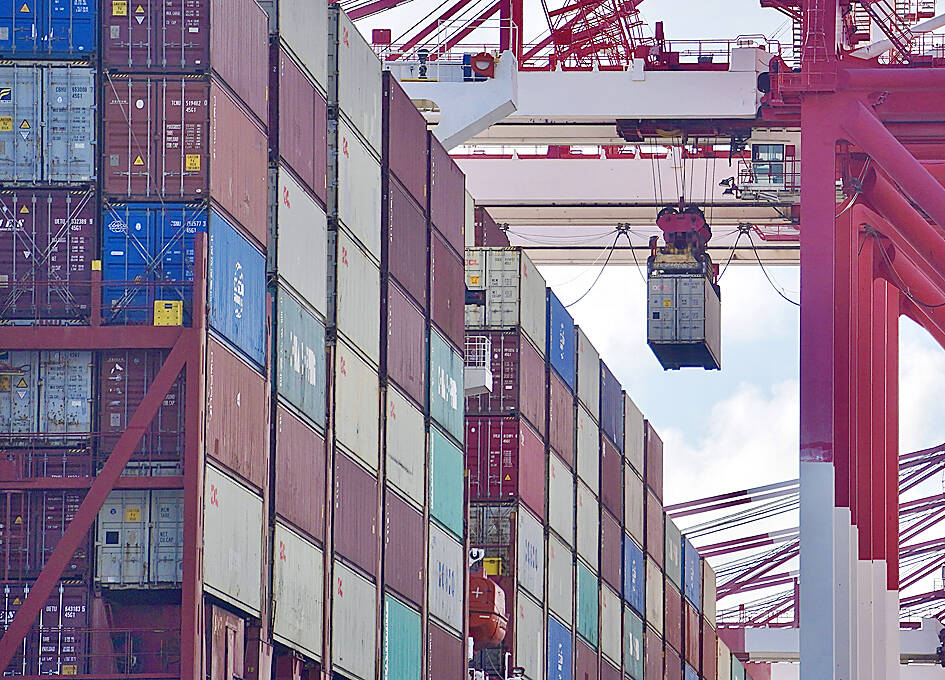Taiwan’s exports last month rose 16.8 percent from a year earlier to a record high US$43.64 billion, as demand for artificial intelligence (AI) products and services remained strong, while non-technology products started to show improvement, the Ministry of Finance said yesterday.
The volume was higher than expected due to shipment delays linked to Typhoon Gaemi in late July, Department of Statistics Director-General Beatrice Tsai (蔡美娜) said.
“The momentum would sustain this month with an expected year-on-year increase of 5 to 9 percent as global technology brands are to launch new-generation gadgets, while AI development continues to gain speed,” Tsai said.

Photo: CNA
Shipments of information and communications technology products soared 71.3 percent to a record high US$12.99 billion, on the back of heavy demand for AI servers, graphic cards and other devices, the ministry’s latest report showed.
However, exports of semiconductors weakened 0.5 percent to US$14 billion, as reshoring activity in the past few years to accommodate global electronics supply chain realignments skewed the comparison, Tsai said.
At the same time, almost all non-tech product categories posted sales uptrends, with 3.8 percent for plastic products and 12.2 percent for textile products, the ministry said.
“The data lent support to a more balanced recovery, although wobbly,” Tsai said.
Imports advanced 11.8 percent year-on-year to US$32.14 billion, giving the nation a trade surplus of US$11.49 billion in the month, suggesting a 33.6 percent increase from a year earlier, the ministry said.
Local firms actively bought semiconductor equipment from abroad to expand capacity and upgrade technology processes, as business visibility turned more lucid, Tsai said, adding that imports of semiconductor equipment last month soared 45.3 percent from a year earlier.
Firms were also more willing to build up input materials for exports later as evidenced by an 11.9 percent rise in imports of agricultural and industrial raw materials, she said.
In the first eight months of this year, exports rose 10.9 percent to US$308.57 billion, while imports increased 9.3 percent to US$256.12 billion, the ministry said.
The figures indicated room of upward revisions for GDP growth this quarter, when exports are set to beat the government’s earlier forecast by 2 to 3 percentage points, Tsai said.
China and Hong Kong remained the largest buyers of Taiwan’s goods last month, when shipments rose 1 percent from a year earlier to US$13.11 billion.
The US followed after purchasing US$11.89 billion worth of Taiwan’s goods, a new high, up 78.5 percent from a year earlier.
Exports to the ASEAN members totaled US$7.25 billion last month, up 5.6 percent from a year earlier, while exports to Europe rose 2.6 percent to US$3.70 billion. Bucking the upturn, exports to Japan fell 17.5 percent to US$2.07 billion due to a decline in electronics shipments.
Exports this month are expected to range between US$40.7 billion and NT$42.3 billion, up 5 to 9 percent from a year earlier, with the moderating growth largely reflecting a relatively high comparison base a year earlier, Tsai said.
Additional reporting by CNA

When an apartment comes up for rent in Germany’s big cities, hundreds of prospective tenants often queue down the street to view it, but the acute shortage of affordable housing is getting scant attention ahead of today’s snap general election. “Housing is one of the main problems for people, but nobody talks about it, nobody takes it seriously,” said Andreas Ibel, president of Build Europe, an association representing housing developers. Migration and the sluggish economy top the list of voters’ concerns, but analysts say housing policy fails to break through as returns on investment take time to register, making the

NOT TO WORRY: Some people are concerned funds might continue moving out of the country, but the central bank said financial account outflows are not unusual in Taiwan Taiwan’s outbound investments hit a new high last year due to investments made by contract chipmaker Taiwan Semiconductor Manufacturing Co (TSMC, 台積電) and other major manufacturers to boost global expansion, the central bank said on Thursday. The net increase in outbound investments last year reached a record US$21.05 billion, while the net increase in outbound investments by Taiwanese residents reached a record US$31.98 billion, central bank data showed. Chen Fei-wen (陳斐紋), deputy director of the central bank’s Department of Economic Research, said the increase was largely due to TSMC’s efforts to expand production in the US and Japan. Investments by Vanguard International

WARNING SHOT: The US president has threatened to impose 25 percent tariffs on all imported vehicles, and similar or higher duties on pharmaceuticals and semiconductors US President Donald Trump on Wednesday suggested that a trade deal with China was “possible” — a key target in the US leader’s tariffs policy. The US in 2020 had already agreed to “a great trade deal with China” and a new deal was “possible,” Trump said. Trump said he expected Chinese President Xi Jinping (習近平) to visit the US, without giving a timeline for his trip. Trump also said that he was talking to China about TikTok, as the US seeks to broker a sale of the popular app owned by Chinese firm ByteDance Ltd (字節跳動). Trump last week said that he had

STRUGGLING TO SURVIVE: The group is proposing a consortium of investors, with Tesla as the largest backer, and possibly a minority investment by Hon Hai Precision Nissan Motor Co shares jumped after the Financial Times reported that a high-level Japanese group has drawn up plans to seek investment from Elon Musk’s Tesla Inc to aid the struggling automaker. The group believes the electric vehicle (EV) maker is interested in acquiring Nissan’s plants in the US, the newspaper reported, citing people it did not identify. The proposal envisions a consortium of investors, with Tesla as the largest backer, but also includes the possibility of a minority investment by Hon Hai Precision Industry Co (鴻海精密) to prevent a full takeover by the Apple supplier, the report said. The group is